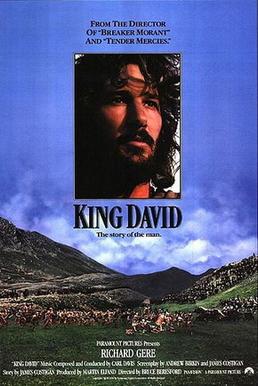A film about David, the young shepherd and musician who eventually became the second king of Israel?
That sounds like a great idea!
After all, David is one of the most compelling figures in history. Whether it’s the slaying of Goliath or his ill-fated friendship with Jonathan or his uneasy relationship with Saul, every detail about David’s youth feels perfect for cinematic drama. And then, once David become king of Israel, the drama doesn’t end. David finds himself dealing with both politics and temptation. He falls in lust with Bathsheba and, in a moment of terrible weakness, he arranges for her husband to be killed in battle. His own son, Absalom, turns against him and then, despite David’s very clear orders to the contrary, Absalom is executed while he helplessly hangs from a tree. For every triumph in David’s life (like the time he used a slingshot to take down Goliath), there’s a tragedy. For all of David’s attempts to be a good and wise king, he still struggles with his own weaknesses. Every detail of David’s life seems like it belongs on the big screen.
So, now that we’ve agreed that the life of David would be perfect for a movie, consider this: A film about David, a master of both poetry and politics who was known for his deep emotions, starring Richard Gere?
Uhmmmm….
The 1985 film, King David, has all the potential to be a great film but it’s pretty much doomed by the fact that David is played by Richard Gere. Today, of course, Richard Gere is an above average character actor who is well-cast as older, seemingly successful men who have never quite conquered their own self-doubt. That’s not the Richard Gere who shows up in King David. The Richard Gere who shows up in King David is the blank-faced, youngish Richard Gere who was best-known for films like An Officer and a Gentleman and American Gigolo. Richard Gere is so miscast as David that just the sight of him takes you out of the film’s reality. While the film plays out, you find yourself saying, “Richard Gere just killed Goliath. Richard Gere just spied on Bathsheba. Richard Gere is dancing through the streets of Jerusalem.”
There are a few good things about King David. Edward Woodward gives a good performance as Saul, who has always been overshadowed David but who was, in his own way, almost as compelling a character. The film does a credible-enough job recreating the ancient world and it’s entertaining to see the iconic Italian actor George Eastman show up as Goliath. Far too often, though, King David becomes one of those films where every big action scene is shown in slow motion and there’s too many close-ups of swords being tossed into the air.
According to Wikipedia (that’s right, I did some “serious” research for this review), King David was actually made because it was felt that the film would be able to draw in the same audience that loved Star Wars. That turned out to not be true as the film was a huge flop and apparently damaged a lot of careers. But, flop or not, it was still on TV last night, which just proves that movies are forever.



 Tom Selleck is Phil Blackwood, a best-selling mystery author who is suffering from writer’s block. Paulina Porizkova in Nina, a beautiful Romanian who has been accused of murder. When Phil sees Nina being arraigned in court, it is love at first sight. He provides her with a false alibi and invites her to stay with him while he writes a book based on her case. At first, Phil thinks that she is innocent but he soon has his doubts, especially after Nina shows off her skills as a knife thrower.
Tom Selleck is Phil Blackwood, a best-selling mystery author who is suffering from writer’s block. Paulina Porizkova in Nina, a beautiful Romanian who has been accused of murder. When Phil sees Nina being arraigned in court, it is love at first sight. He provides her with a false alibi and invites her to stay with him while he writes a book based on her case. At first, Phil thinks that she is innocent but he soon has his doubts, especially after Nina shows off her skills as a knife thrower.